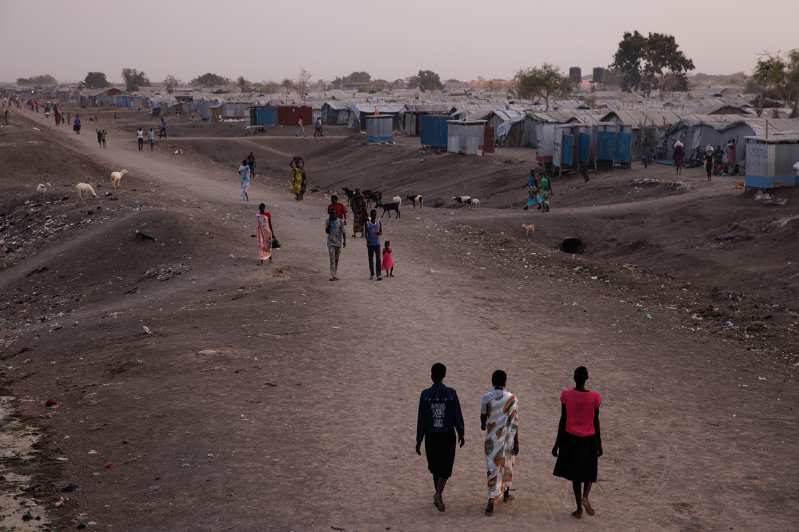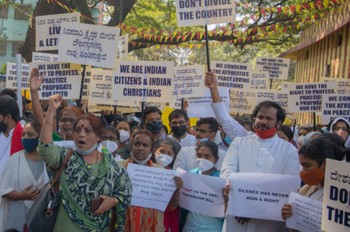
Sudan contributed to the highest global number of human displacement in 2023 according to a United Nations High Commission for Refugees (UNHCR) report. Released days after observing World Refugee Day on June 20th, the UNHCR Global Trends report revealed that more than 7.2 million people have been forced to flee their homes in Sudan due to the conflict between the Sudanese Armed Forces and the Rapid Support Forces that started in April 2023.
In addition to the war, Sudan is one of the countries experiencing severe or extreme levels of climate-related hazards. The 6 million internally displaced people are now exposed to extreme weather conditions such as droughts, floods and extreme heat, in addition to a worsening humanitarian situation.
“Extreme weather events are becoming more frequent and more intense. These have often impacted countries experiencing new or escalating conflicts. In these situations where capacities to adapt are severely limited, climate-related hazards are exacerbating vulnerabilities such as poverty, triggering harmful coping strategies,” noted the UN report.
Approximately 1.2 million Sudanese sought refuge in neighboring countries of Egypt, Central African Republic, Chad, Ethiopia and South Sudan by the end of 2023, with that number expected to go higher, a year after the conflict.
The UN agency noted that Sudan’s neighbors’ healthcare, education, social housing and legal framework are insufficient to accommodate the refugees. It added that 9.1 million people in Sudan are facing a dire humanitarian situation, “the largest number of people ever recorded to have remained displaced within their own country at end-year.”
The situation in Sudan is exacerbated by the fact that over 1 million refugees from South Sudan, Eritrea, Ethiopia and Syria had settled in Sudan before the conflict. “Many have now been forced to return to their home countries prematurely or move on to other countries, often arriving in remote and difficult-to-access locations that lack essential services,” said the report.
The UNHCR report also included the Democratic Republic of Congo, where 2.8 million people were displaced as the conflict between government forces and armed groups escalated in 2023 pushing the total number of Internally Displaced Persons in DRC to 6.3 million people. In Somalia, four years of famine, flash floods in April 2023 and persistent attacks by Al Shabaab militants pushed 1.1 million people to leave their homes.
By the end of 2023, 117.3 million people around the world are living as internally displaced, refugees or asylum-seekers compared to 108.5 in 2022, an increase of 8.8 percent. Nearly half of the 68.3 million internally displaced people are from African countries impacted by war, persecution and adverse weather conditions.
Speaking during the World Refugee Day, UNHCR High Commissioner, Filippo Grandi, said that 700,000 people have fled the war in Sudan and are now living in South Sudan. “Some fled this country long ago to escape South Sudan’s civil war; now they are being forced back to a place still struggling to recover from years of fighting and famine. Others are Sudanese - teachers, doctors, shopkeepers and farmers - who must now navigate life as refugees,” said Grandi when he visited Jamjang Refugee Camp in South Sudan.
Tom Albinson, the President of the International Association for Refugees, said that countries in Sub-Saharan Africa, North Africa and Middle East host 85% of the refugees despite the stretched resources needed to support the refugees.
“The vast majority who flee their countries due to persecution or war, go next door. They are not trying to get further away. They all dream, for the first five years at least, of going back home one day. But when they realize that’s not going to happen, then their choices are very limited,” Albinson told CDI in an interview published for World Refugee Sunday.
Speaking from his 44-years experience working with refugees, Albinson added that the Church stands as a beacon of hope in providing; safe, supportive and social communities in refugee camps, introducing and teaching a Christian worldview, providing emotional and psychosocial support and impacting practical skills to enable refugees to earn a living.
At the same time, many countries experiencing conflict can be difficult environments for Christians who may suffer discrimination or persecution for their faith.
In a statement calling for urgent intervention in Sudan, the Association of Evangelicals in Africa (AEA) said that the conflict has aggravated tensions around religious freedom in Sudan. The association highlighted increased cases of churches being torched and congregations being harassed over the past one year.
“The displacement of millions has led to the breakdown of community structures, including our church communities. Many congregations have been scattered, with members fleeing to different parts of the country or abroad. This scattering has disrupted the spiritual and communal support systems that churches provide, leaving individuals isolated and struggling to maintain their faith and practices in the face of extreme adversity,” noted AEA.
While supporting AEA’s position, the General Secretary of Evangelical Alliance of Sudan, Rafat Samir said that despite the dire humanitarian need and the uncertainty occasioned by the war, many Christians continue to gather, finding ways to worship and support each other even in the face of danger.
“The church in Sudan remains a beacon of hope and resilience,” said Samir.





